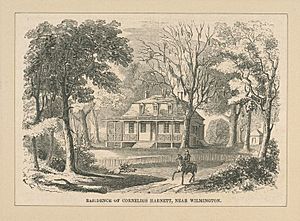Cornelius Harnett facts for kids
Quick facts for kids
Cornelius Harnett
|
|
|---|---|

Poplar Grove, near Wilmington, North Carolina
|
|
| Born | April 10, 1723 |
| Died | April 18, 1781 (aged 58) |
| Occupation | politician |
| Spouse(s) | Mary Hold |
Cornelius Harnett was an important American leader who lived from 1723 to 1781. He was a merchant and a statesman from Wilmington, North Carolina. He played a big part in the American Revolution, helping North Carolina become independent. He also represented North Carolina in the Continental Congress and signed the Articles of Confederation. A county in North Carolina, Harnett County, is named after him.
Contents
Early Life and Interests
Cornelius Harnett was born on April 10, 1723, in Chowan County, North Carolina. His parents were Cornelius and Elizabeth Harnett. Soon after he was born, his family moved to Wilmington.
As an adult, Harnett owned a large farm, known as a plantation, in Wilmington. He became a successful merchant, which means he bought and sold goods. He was also interested in farming and milling, which is the process of grinding grain into flour. He was a very smart person, and this helped him a lot in his love for politics.
Harnett married Mary Holt. They lived on his second plantation, called Poplar Grove. This home was located north of Wilmington in Scotts Hill. Even when he was busy with his political work, he stayed in touch with his wife through letters.
A Leader in the Revolution
Cornelius Harnett became involved in public life in 1750. He was first elected as a town commissioner for Wilmington. Later, the governor appointed him as a justice of the peace for New Hanover County. This meant he helped keep law and order.
Fighting the Stamp Act
In 1765, Harnett became a leader in the Sons of Liberty. This was a group of American colonists who protested against unfair British laws. He was a key figure in resisting the Stamp Act. This law made colonists pay a special tax on many printed materials.
Leading North Carolina
From 1775 to 1776, Harnett served as the first president of the North Carolina Provincial Council. This council was like the main government for North Carolina during the Revolution. It had limited powers but helped guide the state.
The British general, Sir Henry Clinton, even singled out Harnett. In 1776, Clinton offered a general pardon to most colonists. However, he specifically excluded Harnett from this offer. This shows how important Harnett was to the American cause.
National Role and Legacy
Cornelius Harnett was a delegate from Wilmington to several important meetings. These were called the North Carolina Provincial Congresses. He also served as a delegate for North Carolina in the Continental Congress from 1777 to 1779. This was the group of leaders who helped create the United States. He is famous for being one of the people who signed the Articles of Confederation. This was the first agreement that united the 13 American colonies.
Harnett was captured by the British in January 1781, when they took over Wilmington. His health became very poor while he was held prisoner. He passed away on April 28, 1781, shortly after being released.
See also
 | Sharif Bey |
 | Hale Woodruff |
 | Richmond Barthé |
 | Purvis Young |

